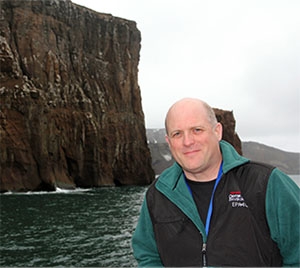Topics
Climate Change

|
Climate ChangeA large fraction of Dan’s research effort is devoted to understanding climate change using information of the past, present and future. Over many years, Dan worked on new ways or reconstructing climate variability in the past to better understand natural sources of climate fluctuations in the Earth system. He has also studied the warm climates of the early Cenozoic to better understand what greenhouse climates may be like in Earth’s future. Current work on modern climate change includes a focus on mechanisms of decadal variability in the tropical Pacific, and how this relates to the episodic nature of global temperature rise. |
Earth History

|
Earth HistoryAs a geologist, much of Dan’s research is focused on understanding the evolution of the environment through time, both on the Earth and on other planets. Dan’s early work was focused on understanding how diagenesis affected reconstructions of warm climates in the Cretaceous. He also developed the use of pore fluids to reconstruct the temperature of the deep ocean during the Last Glacial Maximum, a problem that had long evaded Earth scientists. Dan’s interests in earlier times in Earth history started through his collaboration with Paul Hoffman, working together to develop the Snowball Earth hypothesis, the idea that the Earth experienced a series of extreme glaciations that may have stimulated a rise in atmospheric oxygen and the proliferation of multicellular animals. Inspired by discussions with Maria Zuber, Dan worked on the early climate evolution of Mars with former student Itay Halevy. More recently, he has continued work on Proterozoic climate and environment through a very productive collaboration with colleague Francis Macdonald and his students, and with colleague David Johnston. He has also been developing a theory for what controls the level of atmospheric oxygen over Earth history, working closely with postdoc Tom Laakso. |
Energy Technology & Policy

|
Energy Technology & PolicySince his undergraduate major in Political Science, Dan has maintained an interest in understanding the policy context for his environmental research. Through co-teaching courses with John Holdren for many years, Dan developed an interest in energy technology, wanting not only to understand what is causing climate change but also how to fix it. His initial focus was on carbon capture and storage, a subject he continues to study through a project to understand offshore injection in ocean sediments. Through advisory roles with private companies and the U.S. EPA, he also studied the use of biomass to make low-carbon liquid fuels and its impact on the environment. From 2009 to 2017, Dan served on President Obama’s Council of Advisors on Science and Technology (PCAST), working on reports to the President on a wide variety of subjects in science and technology policy including energy technology and national energy policy, agricultural preparedness, climate change, and STEM education. In 2015, Dan became the Director of the Science, Technology and Public Policy (STPP) program at the Belfer Center for Science and International Affairs at the Harvard Kennedy School. In that capacity, he oversees a team of research fellows who work on a wide variety of issues, from energy and environmental policy to cybersecurity and digital technology policy. |
Geochemistry
GeochemistryGeochemistry is at the core of most of Dan’s research. Much of his work combines novel analytical approaches with geochemical modeling. Dan pioneered the use of atomic absorption spectroscopy to measure minor and trace elements (Sr/Ca ratios and Mg/Ca ratios) in biological carbonates (corals, foraminifera) precisely enough to reconstruct sea surface temperatures over a variety of timescales. With former postdoc Mike Evans, he developed the use of oxygen isotope measurements in cellulose to reconstruct seasonal cycles in tropical trees that lack visible annual rings. More recently, he has worked with former students Kate Dennis and Sierra Petersen to improve the clumped isotope measurements, decreasing sample size requirements. Many students have worked with Dan to develop new measurement techniques including Sasha Turchyn (oxygen isotopes in sulfate) and John Higgins (Mg isotopes in carbonates). In almost every case, novel analytical approaches are combined with a quantitative framework for understanding chemical transport and reaction, as well as biogeochemical cycling, for example his work with former student Julie Shoemaker on understanding methanogenesis in terrestrial wetlands. |
Oceanography

|
OceanographyMany aspects of Dan’s research are focused on understanding the oceans, both the physical circulation and the chemical processes within. Dan started working on using corals to reconstruct ocean conditions with his friend and field-partner, Michael Moore. With Moore and with former postdoc Tom Guilderson, Dan pioneered the use of high-resolution radiocarbon records in coral skeletons to constrain patterns of ocean circulation in the tropical Pacific. Working with Mark Cane and former student Keith Rodgers, they used those radiocarbon data to better measure the skill of ocean circulation models in simulating the shallow circulation in the ventilated thermocline in the Pacific. That work continues with student Lauren Kuntz, using modeling and data from the new Argo floats to examine water transport in the shallow tropical Pacific.
|
